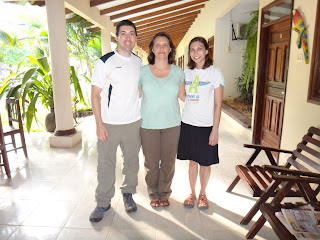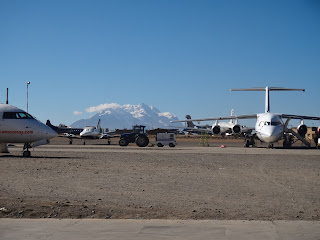The road is unpaved, so it's very bumpy. There are also a lot of cattle that use the road - here's one traffic jam we encountered.
The road is also beautiful - the Beni is located in the Amazon, and we drove through wetlands on the way to Trinidad. Along with the cattle, horses, and dogs moving on the road, we saw lots of birds along the side of the road. The Amazon is beautiful. Partway through the journey, there is a river that you have to cross on boat. Fortunately, the taxis can just drive right onto the boat! Here we are on the boat with our taxi.
After five hours of being jostled about, we arrived in Trinidad with big headaches, but luckily we had a day and a half to recover before starting the residency process here. This also gave us some time to explore the city. Trinidad is much larger than San Borja - it has a population of about 130,000. This means there are more motos, cars, people, and markets (we even found a micromercado - something like a small supermarket). Like many of the other towns in this part of Bolivia, Trinidad was started in the 1700s as a mission by Jesuits. Much like San Borja, it has a large plaza in the center of town with a church.
Our hotel, Santa Anita Hostal, is really nice and has wifi, coffee, water, and refrigerator included in the price ($20/night for a queen sized bed with private bath). However, it did come with 80 mosquitoes as well, which we promptly killed in the first 2 days - Asher went on an aristeia (a word Kelly learned in her freshman seminar) to remove every single mosquito from the room. We're a good team, Kelly spots, Asher kills. Also the room has a great hammock.
On Tuesday, there was a citywide strike to support indigenous leaders in opposition of a planned road that would run through indigenous land - TIPNIS. The strike shut the entire city down. Fortunately, some people informed us of the strike in advance, so we stocked up on some food for Tuesday. We went out to explore the city on Tuesday to see what it was like with very little going on - the markets were closed, every store was shuttered, and few people were out, except a couple juice ladies - who charge you 5 bolivianos (75 cents) for 2 glasses of fresh squeezed OJ made with 6-8 oranges.
There were even roadblocks on the streets to keep motos and cars off the roads. Local teenagers seemed to be having a great time taking over the streets - these guys were thrilled to pose for us while sitting on a bench in the middle of the road. The kids wanted us to tag them on facebook, but unfortunately we didn't get their names.
There were even roadblocks on the streets to keep motos and cars off the roads. Local teenagers seemed to be having a great time taking over the streets - these guys were thrilled to pose for us while sitting on a bench in the middle of the road. The kids wanted us to tag them on facebook, but unfortunately we didn't get their names.
Thankfully (particularly for the people here whose houses are not built for cold weather), temperatures will be in the high 80s again this weekend and into the 90s very soon.
We've met several other researchers in Trinidad - a couple of whom we met in San Borja and ran into here - so we're having a good time. We're also finding the atmosphere very conducive to getting some work done in between exploring the city and doing residency requirements. We're enjoying Trinidad while we're here. Tonight, we even bought a nice Bolivian malbec wine (paired with some cheese crackers and cookies) to enjoy.
Thanks for all of your messages and emails - we love hearing from you while we're gone. Keep them coming!!













































.jpg)
.jpg)